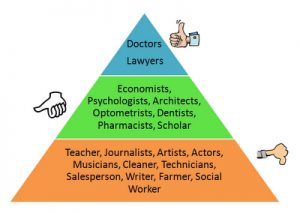It is now all too common to see parents ‘forcing’ their children to do something they want instead of what the children want for themselves. Ask any Asian kid and more likely than not you are going to get the answer that their parents do indeed force the children to do what they want of them.
In this post, I will briefly explore the mindsets of pure – as in, not Westernised; not having lived in a Western community before – Asian parents regarding children’s – primarily boys – education and future. Note: all of these are written based from my own experiences and by no means objective! Comments are welcome.
****
In the Asian mindset, there are three major classes of professions.
 The first class consists of doctors and lawyers. These are the two jobs that are highly appreciated due to the distinction results necessary to pursue them. Doctors and Lawyers are regarded as the top professions of a society because they are the ‘smartest’. Oh, and not to mention they pay well.
The first class consists of doctors and lawyers. These are the two jobs that are highly appreciated due to the distinction results necessary to pursue them. Doctors and Lawyers are regarded as the top professions of a society because they are the ‘smartest’. Oh, and not to mention they pay well.
The second class – not as good as the first class but still acceptable to certain levels – consists of science-based jobs such as engineers, dentists, optometrists, pharmacists, psychologists, and architects. These jobs require slightly lower academic results compared to the first class but they are still competitive. The second class also includes commercial jobs in the fields of finance, accounting and economics due to their good pays.
The third and last class simply consists of the remaining jobs available. Teachers, artists, musicians, actors, journalists, salesperson, event organizer, cleaner, technicians, you name them. These are the jobs that do not require a high standard of education and results to get into. According to most Asian parents, these are the jobs that are ‘common-sense’ and that anybody can do well, regardless of whether they go to university or not. As a result, it has no value.
This stereotype of professions could have originated from the poor background history of many Asians – compared to the Westerns. Being poor, many couldn’t afford to go to school. Going to school was a privilege as it opened the path to becoming famous and rich.
Although the world we live in has changed considerably, this mindset still hasn’t. If the parents could afford it and the kid’s results are good enough, the kids do not have much of a choice except to go to university. And in university, the kids must study something either in the first or second class as the third class was simply just ‘common-sense’ that non-university graduates can also succeed in.
And as the first and second class are mostly science-based, almost all Asian communities promote the natural science subjects (math, biology, chemistry, physics) and logical (left-brain) learning. A Western coming to Asia and will most likely see students who are better than them in maths but much worse in the languages or the arts.
*****
Now while there are three classes of professions, there are also three types of parents.
The first type parents are parents who are really forceful in their children’s pursuit of first class professions – doctors or lawyers. They do not hide their expectations. They pressure the children to do well in school and unless results are stellar, they are punished. They need their children to be the best in their community to preserve their name and reputation. That was more important than the children’s happiness or satisfaction. No, their excuses are always the same: ‘I know what’s best of you and that is to be a doctor or a lawyer and earn lots of money.’ And gradually, this teaches the children to be competitive in their approach to life, which is detrimental to their abilities to find peace and work cooperatively in the future.
The second type parents are slightly less forceful. These are the parents who are usually more exposed to the Western world than the first type parents. They want their children to be happy, or that’s what they say. They push instead of force their children to achieve high standards. And when the times come for the children to go for universities, they let them choose – or so they think. If the child chooses something in the first class or second class professions, they would be more than happy to support him emotionally and financially. However, if the child chooses something in the third class profession, they will tell the child to think again. To the second type parents, any third class profession that the child chooses are not the profession that the child really wants. They don’t express their expectations out clearly, but in their head they are quite similar to the first type parents. The only difference is their approach towards the child. While the first type parent will get it out of their child by force, the second type parent will talk it out of child by subtle manipulation. When accused to force their child into studying first or second class professions, they will deny it.
Now, the last type of parents are the ones who allow their children to do anything they like, regardless of whether it is a first class, second class, or third class profession. To the typical Asian mindset, these kinds of parent are bad parents because they are not thinking about their children’s future welfare. But to the third type parent, as long as their children are raised up to think ethically, they have done their job well. What the child does when he grows up is not the parents’ choice. The child’s life does not say anything about the parents. All they want is for their children to be happy and satisfied with their jobs. And to do that, they as parents will support the children all the way in the children’s pursuit for happiness.
Sadly, most Asian parents nowadays are still in the first and second categories. I believe it to be a fact based on my personal experience but there is nothing I can do unless the parents themselves start to change.




I enjoyed your rich writing. super information. I hope you release many. I will carry on watching
This article is surprisingly accurate, informative, and myself being Asian, funny to me at the same time. I would say my parents are the second type. If it weren’t for Christianity, they would probably be of the first type. lol.
Interesting. I am around Asians a lot because of my meditation practice and I get a lot of criticism and have even been openly told that I am dumb. I find it very hard to be around these people. I have a degree in art and am pretty poor by American standards, and am happy that my children are into the arts, but my Asian acquaintances constantly make fun of me because I know little about computers, math ect… and seem to be unable to appreciate my skills as being of any worth at all. It must be hard for right brained, creative type people who are Asian. It almost seems like human worth is valued, merely by how much money people can make. It’s sad that a culture which once contained so much depth and wisdom and been reduced to this.
Oh, you forget something. ENGINEERS are also in the first-class community. So I’m considered a third-class, haha, and my parents want me to be there. I’m from Malaysia. But, I agree with you. This is real typical Asian mindset. =)
Wait, I mean engineers should be in the first-class communnity. Typed wrongly sorry.
omg my parents are bad parents 😛 haha
so true
Dear writer,
I would have graded your essay an “A” if you had approached it from a more neutral angle, and leave it to the maturity of the readers to decide for themselves what is “good” or “bad. While you started off by saying “I will briefly explore ..”, you have gone on to influence, to be presenter and judge all at the same time. In your closing, you stated “Sadly, most Asian parents nowadays are still in the first and second categories”. By stating so, you have turned from exploring and presenting, to judging parents as “good” or “bad”, and you are not even a parent yet, then. By using the word “sadly”, you have judged that the second category parents are “regrettable”. If you decide to do so and use words like “manipulation”, you need to be really sure-footed and be irrefutable. I note your “personal experience” basis, so unfortunately your experiences could have contributed to your somewhat prejudiced views/arguments, which opinion I will try to explain later on (to be fair to you). While attempting to sound candid/funny, you ought to be careful about being accurate too. In writing this, you ought to first note that at the time of writing, you have yet to become a parent to truly know and experience what it is like to be a parent, to understand their concerns and cares from their point of view. At this point, you are mostly a spender of money, other people’s hard-earned money. That I think, is one of the problems of the present generations.
Hence my this response is to caution the many readers out there who seem to gloat & go goo-goo gah-gah over your article, as many seem to be not only encouraged but also influenced by your some of your writings (while decent overall) and judgements. If I am wrong, readers please ignore.
The first part of your essay in job classes was already a great generalization and being judgemental – your graphical illustration and expressions like “These are the two jobs that are highly appreciated due to the distinction results necessary to pursue them. Doctors and Lawyers are regarded as the top professions ….”. By writing so simplistically, you have immediately cast aside so many many other professions that actually require even higher distinctions and qualifications to get into. I know you mean that these are the mindsets of parents generally (not yours) – which is even more totally un-substantiated. What research or statistics have you quoted or made of your own to back up your generalization? As some readers have quickly pointed out, you have put some professions in the wrong class, even as you started out on your “exploration”. However, what really prompted my response is this below:
2nd.Type Parents:
I generally agree with you on the first “type of parents”…the kind who “force” their children mostly, and to take up certain professions. Being forced to do something you don’t have a passion or liking or even talent for, for possibly a lifetime does not make sense. No happiness for both parent and child.
But I think you crossed the line when you stated “…the second type parent will talk it out of the child by subtle manipulation” in combination with the word “sadly” mentioned earlier.
I do not see anything wrong with the second type parents that you described. The 2nd type is about responsible parenthood. Anything less is being irresponsible. I am an Asian parent of two grown up children and consider myself sufficiently qualified to comment. This is not a cloak and dagger, playing /manipulation game here. You gradually imply many things being wrong with second type parents. You said “Pushing instead of forcing to achieve high standards”. I see nothing wrong here, just responsible parenthood. Every student or athlete needs pushing to achieve higher standards. You said “If a child chooses 3rd class profession, parents will tell the child to think again”. Again, what is wrong about giving advice? On the contrary, it is irresponsible parenthood if one neglects this duty to advise and caution.
There are many factors to consider before judging that parents are “forcing” their children when they give “advice”. For example, if a parent can see that a child has no passion for treating/healing the sick, then they should not force the child into medicine no matter how many “As” the child has. If a child is not technically inclined or hates the sciences/maths, it makes no sense to force the child to take up engineering or architecture. On the other hand if the child shows extra-ordinary talent in creativity and music/the arts, then stopping the child from going further is denying him/her the chance to excel in what he/she can be. Point is, there is nothing wrong with “pushing a child to high standards” and telling (advising) a child to think again if the child chooses a 3rd class profession (for which he/she has little talent for, or which generally earns a low income). Get real, we are living in competitive times. Every normal and caring parent will be duty-bound to advise their young child. Have you considered the fact that wiser choices of studies are often made after consulting parents and career counselors, instead of just relying on “what I like to do”? Also, such matters often need discussions and careful decision as a huge fortune from the family’s savings could be spent, not to mention the years spent on a “wrong” course of study. Parents also do have a say, as it is after all, their life-long savings about to be spent quickly by a young naïve person, just about to get to know the real world. In fact, many graduates these days after completing a course of study that balanced their passion with market demand, move on freely to other careers of their choice and new-found interests. Their choices do not end with their first degree. With good parental guidance, their degree was just a solid foundation and stepping stone to better things. Happy parents, grateful children. Do not mix guidance with manipulation. Choice of studies need not always be a picture of rebellion or tussle with parents.
On the 3rd category parent, please quote me a parent (Asian or not) who will say “pick WHATEVER course …anything you like dear…any class dear, and I will support you 100%; here’s my life-long savings of $500,000/- at your disposal, no questions asked, no discussions needed”, and I will show you an irresponsible (bad, rather dumb) parent. Do bad or dumb parents exist?
Unfortunately, your essay has painted quite the opposite – the first and second parent categories as “sad” (bad), and the 3rd category parents implicitly, as “good/better”. Which is why I bother to comment.
Most Asian parents in my city are in the third category and almost all the Asians
in my school do art or sports as extracurriculars.
relatable af
That’s funny because my parents are white but they think EXACTLY like this.
To be honest with you this does not represent entire Asia. In South Asia, doctors and engineers are considered as top class job. Lawyers could be a second choice.